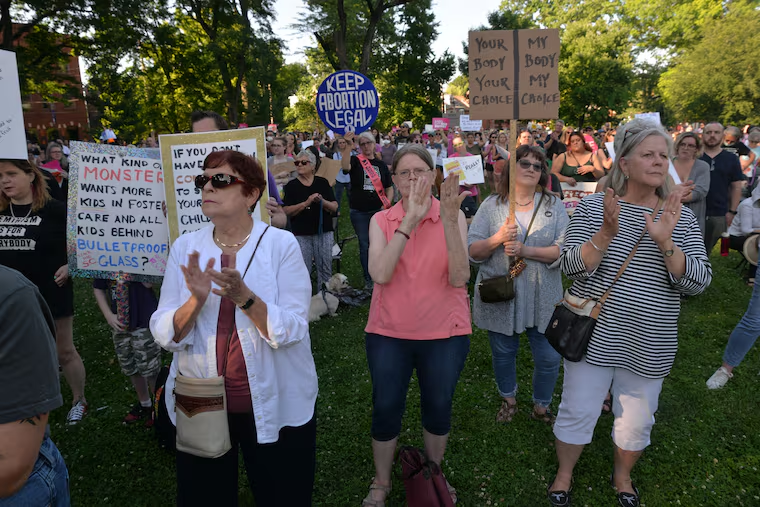At Pa. abortion clinics, volunteer patient escorts brace for their work to get even harder post-Roe
York retiree Linda Hengst has been helping patients get through shouting protesters since 1973. She sees the work as key to protecting human rights.

When a car pulls into the small parking lot next to the clinic on Beaver Street in York, Linda Hengst hustles over. She wants to be waiting at the driver’s window when the engine shuts off.
“Do you have an appointment at Planned Parenthood?” she asks, though she can guess the answer from the red, swollen eyes staring back at her.
Hengst, a 79-year-old retiree from York, is among the cadre of volunteers who escort patients from their car, past abortion protesters and into the clinic. They spend barely a minute with each patient but play a critical role in overcoming one of the final barriers to care: standing up to strangers hurling pleas, insults, and threats of eternal damnation.
And their job is about to become even more important: While at least 26 states are expected to ban or severely restrict abortion with Roe v. Wade overturned, abortion remains legal in Pennsylvania through the 24th week of pregnancy. Providers here expect that protesters emboldened by the U.S. Supreme Court ruling striking down the right to abortion will ratchet up their pressure on those seeking abortion care.
“Right now, as we speak, we have protesters celebrating outside our clinics while our patients are inside trying to access abortion care,” said Melissa Reed, CEO of Planned Parenthood Keystone, hours after the Supreme Court decision Friday.
» READ MORE: Pa. abortion providers are bracing for a surge in patients if Roe v. Wade is overturned
Planned Parenthood Keystone, which operates clinics in eastern Pennsylvania, including the York facility, wants to bring on more volunteer escorts after the court decision, Reed said.
All are trained in how to speak with patients and how to manage the stress of constant goading from protesters without reacting. When the job starts getting to her, Hengst said, she leans on the other patient escort volunteers for support.
Hengst has been volunteering as a clinic escort off and on since abortion became legal in 1973. She has always felt strongly about women’s rights — she prefers to call them human rights — and saw volunteering to protect patients as a way to be part of an important cause.
A friend who was a doctor in New York City used to tell Hengst of the patients who came to the emergency department with botched abortions. Shortly after Roe passed, someone close to Hengst needed an abortion, which made the issue even more personal.
Since retiring from her job in nonprofit administration, Hengst volunteers as a clinic escort at Planned Parenthood’s York or Harrisburg locations twice a week. She was at the York clinic Friday, when the Supreme Court decision was released.
Everyone’s phones — volunteers and protesters — went off in concert. Hengst’s heart sank. The three protesters out front cheered. Then, it was business as usual:
Each volunteer, while following the training, has an individual approach. Hengst tells patients that she’s going to walk with them to the clinic, that they don’t have to accept any pamphlets or prayer cards protesters push on them, and that she’s going to keep talking to them all the way to the entrance.
“Sometimes I’ll comment on a piece of clothing, or often I’ll talk about the weather — anything that will keep them from thinking about the people accosting them,” Hengst said.
By now, Hengst knows the protesters as well as she knows her fellow volunteers. Many are respectful to patients, but others follow patients across the alley from the parking lot and up the ramp to the door, yelling insults and obscenities, Hengst said. One group parks a van with an ultrasound machine inside across the street and tries to persuade patients to come with them for a free picture of their fetus.
Only once has one of Hengst’s patients ever turned around and gone back to her car.
Hengst could tell when she peered into the car window that the young woman was distraught. She suggested they sit on the curb and talk quietly.
“Be sure this is what you want, and then we’ll go,” Hengst recalled telling her. “You know, you don’t have to go in. It’s up to you.”
After a while, the woman decided to go into the clinic, but came out shortly after, and went to the protesters, who embraced her. Hengst thinks the woman never returned for the abortion.
“They consider that such a win. They don’t understand that that’s what we want, too,” Hengst said. “We want her to do whatever she wants.”
» READ MORE: A doctor who treated botched abortions pre-Roe looks back: ‘A matter of life and death’